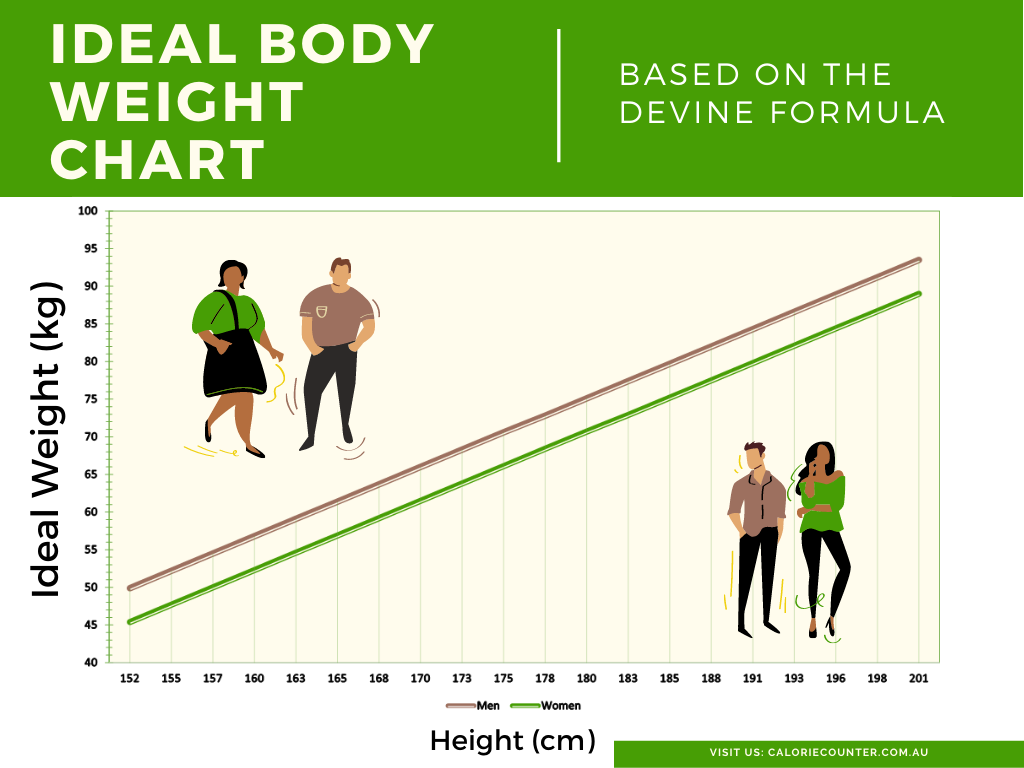Use our calcount Ideal Body Weight (IBW) Calculator to compute the “perfect” weight for your height and gender. Simply select female or male, then use the slider or type your height in cm to see your ideal body weight in kg. If interested, read on further to learn how and why this calculator works!
The Ideal Body Weight
Somewhere, there exists an ideal person, and that perfect human has the ideal body weight. Their height and weight are in sublime harmony. Perhaps, that person only exists in the philosophy of Plato’s World of Forms but that has not stopped scientists from coming up with formulas to calculate everyone’s ideal weight.
Not So Ideal
Before delving deeper into the whys and wherefores of calculating ideal body weight (IBW), it must be understood that there is no universally agreed optimum weight for a given height. Leaving aside the philosophical and ethical challenges of human body weight classifications, several practical issues make IBW calculations hard to do.
The main issue is that people are different by nature, so an ideal weight for one person may not be a good weight for another person. A muscle-bound athlete is likely to have a body weight which exceeds the calculated ideal, simply due to the extra muscle tissue. Elderly people suffering from advanced sarcopenia (age-related muscle loss) might have an ideal weight yet be carrying unhealthy fat deposits. Tall and short people are left out from formulas which work best for the average-height person. Likewise for pregnant, large, or small framed people.
Not for Kids
The ideal body weight calculator does not apply to kids, because most (all?) formulae just don’t work with growing bodies. Children’s body proportions change with growth, so weight to height ratios that statistically work well in adult populations make less sense for kids. Furthermore, popular IBW formulae tend to provide unrealistic results in IBW calculations for people under 152cm in height.
Ideal Body Weight Definition
Caveats aside, it is useful to calculate and aspire to a defined ideal body weight. Why? Because the definition of ideal body weight (IBW) is: the optimal weight associated with maximum life expectancy for a given height, according to Yuan and Sinha. The data to support the concept of IBW comes from life-insurance statistics. Now, who does not want to achieve the weight which gives them the best chance of growing really old?

Ideal Body Weight Calculation Formula
There are literally hundreds of different formulae and variations on the most popular formula to calculate the ideal body weight. Before the introduction of BMI, ideal body weight (IBW) formulas were widely used as the yardstick of healthy weight. The IBW formula published in 1974 by Ben Devine is the one most used today. It was first used to estimate how fast drugs passed through obese people compared to others.
Our calcount IBW calculator uses this Devine formula. Whilst not perfect (none of the formulae are), the Devine formula is the most useful one. There may be better, more scientific, IBW formulae out there, but none are more popular than Devine. The actual formula is simple:
For Males: 50 kg + 0.9 kg × (person’s height (cm) − 152)
For Females: 45.5 kg + 0.9 kg × (person’s height (cm) − 152)
The Ideal Body Weight Chart
The Devine formula, plotted on a graph, makes a useful ideal body weight chart. Results above the line are considered to be overweight, whilst those under the line are underweight. The ideal weight for a given height is right on the line.

What’s the Point?
At the end of the day, there is no such thing as an Ideal Body Weight for an individual person. However, the calculated IBW is a useful number to aim for when purposefully managing body weight to support good health. People who are close to their IBW feel and look better. They generally have better health than people who are nowhere close to their IBW. BMI, WHR and other measures may be better, but only IBW gives you a single, unequivocal targeted ideal weight.









